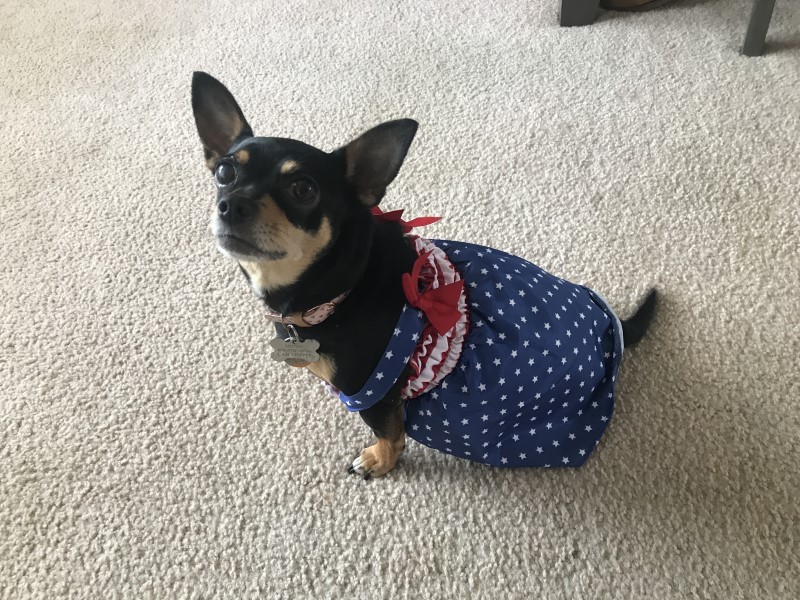The Independence Day holiday usually starts with a meal and ends with the bang of fireworks. However, with large, public displays canceled or postponed due to COVID-19 concerns, many people are creating their own fun.
But, what about the critters we call our companions, who may be jittery or nervous by the sounds?
"This may not be too pertinent, but leave your pet home," is the first rule for fireworks in veterinarian Dr. Marie Lance's book. She spoke on Mornings on Maine Street this week. "Don't take them to a fireworks show, that's just asking for a problem. Your pet doesn't understand that it's Independence Day."
Lance reminded pet owners that their pets' ears are highly sensitive and the smells, like fire and burning, can upset pets easily, as well as causing some respitory distress.
"Leave them inside, not in the backyard, because dogs become escape artists when they panic," Lance said. "There are more pets turned into shelters after the Fourth of July weekend because they have escaped what they feel like is a horrible event."
If your pet does manage to escape during the celebrations,
Lance said make sure your pet has a tag with your information. She suggests at least your name and cell phone number. Better yet, make sure your furry friend is microchipped and the chip information is up to date.
For those who have crate-trained pets, Lance encourages using the crate and creating a comfortable space. "Give them their den, give them their safe place, give them their chew toy of a Kong with peanut butter, put them in a quiet room."
She warned that if your pet is not crate trained, now is not the time to try it out. "You may have to consult with your veterinarian with some chemical help to try and get your pet to be calm."
If you must bring them to a picnic, gathering or other event, try to get them home and secured before the fireworks start, Lance suggested. She also encouraged the use of pet-safe sunscreen and bug repellent, and not to assume the human versions would be an acceptable substitute.
Whether or not you are chosing to imbibe during your gathering, Lance said to watch out for snouts seeking half empty cans, bottles and cups. "Pets can get up on picnic tables and alcohol is not good for them," Lance stressed. "Make sure you provide plenty of clean water for them to drink, don't let cousin Eddie slip the dog a beer on the side."
As tempting as it can be to let Fido or Fluffy have a holiday snack, Lance said table scraps are a big no-no, as are open trash containers.
"Unfortunately after the Fourth of July, we see a lot more corn cob obstructions on X-ray -it looks just like a corn cob - exactly. And those don't come through the other end, they come out through a hole we have to make. So let's avoid any type of obstruction surgery by making sure the trash is put in a safe place. And the same thing with bones that can cause pancreatitus, onion, garlic, raisins (grapes), chocolate, xylitol (artifical sweetner found in many chewing gums), just all the safety things we talk about every holiday."
Lance also said to remind children and adults alike not to share their glowsticks with pets. "Glowsticks, they're fun, but the dog doesn't need to eat them," Lance said. "They're not necessarily toxic, poisinous-toxic, but they can cause GI irritation and, again, obstruction."
Lighter fluid and matches seem unappealing, but Lance said some dogs will lick up the fluid or eat spent matches, and to keep those statshed away in a safe place.
And, it probably goes without saying, but Lance reminds pet owners not to be cruel, accidentally or otherwise, as firecrackers can lead to burns and expose pets to toxins.
"Never use fireworks when your pet is involved. It's the bad jokes, the 'oh, look, fetch' when you're throwing those things? Your dog doesn't know what's on the other end."
Another easy way to prepare for the Fourth is to make sure animal emergency contacts are active and available.
"Where are you going to go if you're visiting, and I don't like to sound gloom and doom, but it's better to be prepared and not need it, than to be scrambling when you do need it. So know where the closest emergency veterinary hospital is."
Listen to the full interview with Dr. Lance by clicking the play button above.
Emergency Vets around North Georgia
AnEmerg - Gainesville/Hall County
Blue Pearl Veterinary Hospital - Lawrenceville/Gwinnett County
North Georgia Veterinary Specialists - Buford/Gwinnett County
Town and Country Veterinary Hospital - Mt. Airy/Habersham County
Pet Poison Control
1-855-213-6680

http://accesswdun.com/article/2020/7/917265/big-booms-unattended-food-create-risky-environment-for-pets
